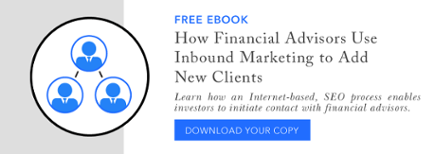Financially Focused Inbound Marketing Agencies Do More For Advisors
Inbound marketing agencies come in two categories: Generalists and specialists. Generalist firms can do fine for businesses in easy-to-understand categories. But when it comes to a high-trust, highly regulated profession like financial advice and wealth management, the generalized firms just don’t cut the mustard. In today’s digital-intensive sales environment, you need a digital marketing partner with a deep understanding of your specific industry and what it takes to create a qualified lead that you can turn into a client.
Here’s why:
The financial services industry is different than most industries. It requires a specialized body of knowledge even to begin to create marketing material. Everybody understands the different specializations within car repair companies and even among doctors. General marketing professionals usually understand it. But the difference between a stock broker, an insurance agent and an RIA is not so well known – even in the marketing community.
If your inbound marketing agencies don’t fully grasp what you do and the kind of people you need to reach, you’re going to have problems:
- Your messaging will be off.
- Your leads won’t be qualified.
- Your leads won’t be looking for the specific services you as a financial planner, advisor or wealth manager provide, or the type of engagement that is profitable for you and your practice.
The Trust Factor
What’s more, they may not understand the unique challenge that financial industry marketers face: Overcoming customer skepticism and building trust from the very first glance.
Financial advisory firms aren’t like restaurants. People try new restaurants all the time. They are very open to trying new experiences. They also don’t generally ask for contact information, and nobody’s filling out an in-depth factfinder about their financial situation when they just want to try the veal.
In the financial industry, on the other hand, trust is everything. When it comes to inbound web traffic, if you cannot establish your firm’s credibility and trustworthiness on the first page, you won’t have an engagement.
But the financial services industry has a trust problem: Financial services is the least trusted major industry in the United States, with only 54 percent of consumers saying they trust financial service providers in general. Specifically, only 50 percent of consumers trust financial advisory and asset management firms, according to the Edelman Trust Barometer Financial Services Industry report. That’s worse than the energy industry (61 percent) and that’s saying something.
Within seconds, your website has to communicate competence, professionalism, integrity, technological sophistication, transparency, respect for privacy and the ability to understand and connect with your market.
Content Isn’t King; Quality Content is King
Over time, great content is the key to earning the prospect’s trust. If you can’t close the lead right away, then the content in your lead-nurturing program is what’s going to win them over.
In the financial industry, high-quality content that can truly add value for an educated, affluent pre-retiree or business owner is an absolute must. Anything less is counterproductive.
It also requires a steep learning curve and a specialized body of knowledge. Generalist writers and content marketers just aren’t up to it. Most general inbound marketing agencies wouldn’t recognize quality, accurate financial writing if they saw it. And if they don’t understand how financial service companies are regulated, they could even potentially get you into trouble.
In short, your core need is not aligned with their core expertise.
What Questions Does Your Digital Marketing Firm Ask You?
As a financial advisor, the first thing you do when bringing on a new client is complete a detailed factfinder. You can’t serve the client without having a detailed understanding of their current financial position, goals, desires, risk tolerance and overall value system when it comes to money.
By the same token, how can your digital marketing or writing firm partner do the same for you without a similarly detailed factfinder? How can they sell your services if they don’t know exactly who you are and what you do?
They should be asking you about these issues:
- What credentials do you hold?
- What services do you provide?
- Who is your core client? Who would you like to reach?
- What’s your financial industry and entrepreneurial/management experience?
- Are you a fiduciary? (Do they even know what that is?)
- What professional associations do you belong to?
- What are your policies regarding compliance, privacy and transparency?
- How are you compensated? What’s your fee structure?
- Do you have account minimums?
- Do you specialize in any kind of client?
The Acid Test
Here’s a project for you: Ask a representative from a general digital-marketing-firm whether they’re familiar with recent changes to the Investment Advisers Act that govern disclosures that certain financial professionals must provide on their websites and other written communications. If they don’t know what you’re talking about, you need a partner with a better understanding of the financial services business.
Turn Your Website Into a Lead Generating Asset
Too often, inbound marketing agencies don’t grasp the importance of turning your website into a powerful engine for lead generation. They may have some fine designers and excellent copywriters, but if all they’re doing is creating a beautiful print brochure and turning it into a website, that leads to mission failure as far as your business is concerned.
Your website should be regularly generating leads for you to follow up on, either with a direct phone call or via a carefully designed and preferably automated lead-nurturing program. According to data from Gleanster Research, 50 percent of leads are qualified but not ready to buy. You can still work these leads with a well-designed and automated lead-nurturing program: Our data indicates that leads that are nurtured result in 20 percent better results than non-nurtured leads.
But you can’t do it all yourself. And here’s where the generalist firm has trouble: It takes great content to fuel a good lead-nurturing program. One or two bad pieces from a copywriter who just doesn’t understand your industry or basic investment terms, and your firm’s credibility is shot with any informed reader.
By partnering with inbound marketing agencies that specialize in financial advisory firms, RIAs and other high-touch financial service practices, you won’t have to spend time writing everything yourself. You can spend that time speaking with and serving your clients, and turning leads into new clients.


